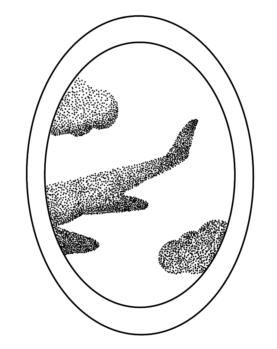You have one message unread.
Text messages have become my new norm for receiving bad news. Fresh off the high of finishing my college applications, I was heading home when my phone buzzed. A seemingly blasé occurrence, I glanced at my iMessage notifications and froze.
Your Opa has just passed away.
My Opa (German for grandpa), who had been a constant presence in my life ever since I could remember, had finally lost his battle with a neverending host of debilitating conditions.
Nearly a year later, I was heading to breakfast at Annenberg when my phone buzzed again.
Did you see what happened? I can’t believe that there might be people we know on there…
Yet again, I was caught off guard. This time, I felt none of the finality that last year’s text brought me. Instead, I, along with my teammates, my skating club, and the nation, waited in anxious disarray as more information came throughout the day.
In some ways, the devastation surrounding AE Flight 5342 was nothing like the death of my Opa. My grandfather’s health had been declining for many months prior. He had been in and out of the hospital after falling due to atrophying muscles or collapsing due to low insulin each time he returned home. His passing was the finale of many long hours in waiting rooms, worried calls to doctors, and failed efforts to rehabilitate him at home.
What I remember most after reading my parents’ message was emptiness. I just couldn’t reconcile that my Opa would no longer pull up to my apartment in his red Mitsubishi to drive me to skating practice, talk to me about some esoteric history fact, or even bake me bread for breakfast. Each member of my family had to face similar realizations and for a while, dinnertime was a quiet affair as we took our own time to process it.
It was also hard for my team to cope. At practice that week, we warmed up in complete silence, a drastic shift from our usual boisterous noise as we rolled out and stretched. We held hands and buried wet faces into neighboring shoulders as we tried to focus on our programs.
Grief after the death of a loved one is both a burden and a privilege. To know—as no other creature does—that our existence is finite gives greater depth and meaning to our lives. But in its presence, we also face the challenge of reconciling a hole in our lives that is impossible to fill or replace.
The lobby of the Skating Club of Boston now overflows with an assortment of flowers that remind me of the faces I will never have the chance to see again. Every morning, come rain or shine, I saw these athletes, their parents, and their coaches hard at work. I won’t pretend I knew Jinna Han, Spencer Lane, or Maxim Naumov’s parents well. Yet they were inextricably connected to me, my teammates, my trainers, and my coaches in the sheer passion we had for skating. Just like with my Opa, it was impossible to imagine them gone so fast and so terribly.
After both of these losses, I was lucky to have both my immediate family and my chosen family—my skating team—to lean on. Alone, each of us would have succumbed to the overwhelming emotion that follows any loss. In those moments, grieving becomes less about isolation and more about solidarity—we found comfort not in being alone with our sadness, but surrounded by others who understood the magnitude of the pain.
Healing for my family has become less about moving on from loss and more about finding new ways to live with it. As our lives have continued to change, with my graduation and my brother’s college applications, my family has focused on caring for my grandmother and managing what my Opa has left behind. In the space where my Opa was, we found new ways to build connections with our family in Germany and find meaning in what it means to be a family.
When I first heard about the crash, I was worried about how skaters in other disciplines would handle the loss. Figure skating can be an isolating sport. Many skaters forgo a regular school and social life to pursue their dreams of one day competing abroad and skating at the Olympics. Grueling hours spent in freezing rinks don’t always guarantee success or satisfaction. We in the figure skating community know that never-ending toil towards perfection and purpose through our time on the ice.
That shared struggle has only brought us closer in the past week. U.S. Figure Skating and SCOB have been so helpful with their mental health support and their protection of young skaters from the swarm of media that descended in the next few days following the crash. This week, thousands of fans came to SCOB to show us their love of the sport and the skaters who passed.
The day after we heard about the crash, my team returned to SCOB for early morning practice along with the other regulars. All of us are in the midst of our competitive seasons, and we cannot afford even a few days off. Yet, while it was difficult to return during such a somber time, there was something strangely comforting about the constancy of training. At least one thing had not changed: we were still together, working towards the same goal and supporting one another, one day at a time.
Caroline Stohrer ’28 (carolinestohrer@college.harvard.edu) is a synchronized skater for the Haydenettes and trains most days at the Skating Club of Boston.

